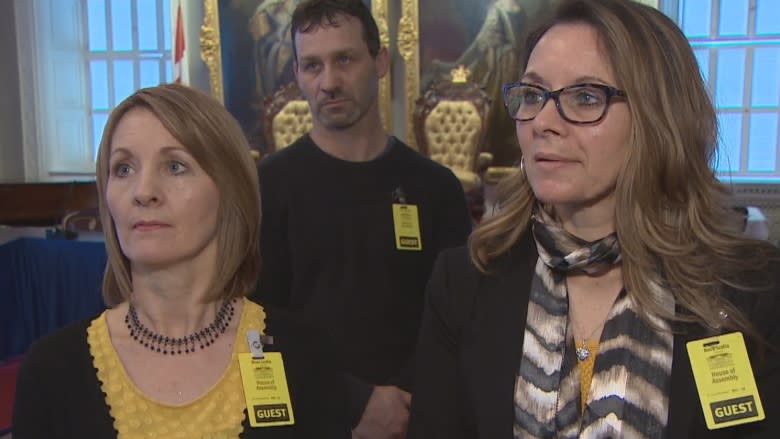'No dignity for anybody': More calls for improved palliative care at Strait Richmond
Catherine Warner and her siblings don't want other people going through the same experience as their family, and they're raising their voices in hopes it brings improved end-of-life care.
Their mother, Marie Elizabeth Cole, spent five days in the emergency department of the Strait Richmond Hospital in Evanston, N.S., in early March, before dying of terminal cancer on March 7. Their mother was at the end of her life, but those final days lacked any sense of comfort, said Warner.
"We stayed there for five days in the emergency room," she said in an interview earlier this week at Province House.
'No dignity for anybody'
While she was in hospital, their mother was moved three times. There was little room for family, and at times their mother was sharing a room with people dealing with their own challenges, such as dementia.
"There was no dignity for anybody in the room," said Nancy Day, another of Cole's daughters.
Warner, Day and three other siblings were in Halifax Tuesday as their MLA, Alana Paon, raised their mother's story on the floor of the legislature.
'We need beds for these people'
Warner said she and her family hope that by speaking about their situation, others will do the same. If people are uncomfortable speaking out, Warner and her family are prepared to do it for them.
"I know our issue, it's not isolated," said Warner. She said Strait Richmond lacks the amount of guaranteed palliative care the area requires.
"At the end of the day, we need to provide these beds for these people. We need to provide a dignified way for people who are at the end of their life."
The case of Liz Cole is the second such case Paon has raised recently at Province House. Again she tabled a proposal the local palliative care society submitted several years ago, and again she called for meetings between the community and Nova Scotia Health Authority.
As he did with the case of Danny Latimer, a palliative patient who spent two days on a stretcher at Strait Richmond, Premier Stephen McNeil said what happened to Cole is unacceptable. He pledged to get the palliative care society's proposal where it needed to go and to arrange the meetings Paon requested.
Paon is pleased the premier is acknowledging there's a problem, but she also thinks it's taking too long for the health authority to examine what's happening at Strait Richmond and other places that need more palliative-care supports.
"We need to get something done. Things have to change."
Space is still a challenge
Like Cole's family, Paon praised the staff at Strait Richmond for their skill and compassion, but said the situation is also unfair to them.
"Asking staff to give so much of themselves without the resources … to be able to deliver these services is not OK. We can do better."
Madonna MacDonald, the senior director of acute medicine for the Nova Scotia Health Authority, said efforts continue to develop a province-wide strategy for palliative care.
MacDonald said there have been many advancements in training for health-care professionals and options for families in recent years, but she acknowledged physical space in hospitals for palliative care continues to be a challenge.
"It is distressing to learn that patients who are dying as a result of a palliative situation have passed away in the emergency room because of the overcapacity," she said.
Giving voice to the voiceless
MacDonald said it's very challenging to balance the need of beds for frail seniors waiting for long-term care while being able to provide the appropriate setting for people who need palliative care. The health authority is looking at how to dedicate beds or perhaps even increase capacity at Strait Richmond, said MacDonald. The hospital has two rooms for palliative care, but they aren't reserved for that service. The next-closest options are Antigonish or Sydney.
Day and her siblings said they felt like going public with their story and travelling to the legislature was what their mother would have wanted.
"She was a strong woman, she was an Acadian woman," said Day. "She'd want us to be strong and she'd want us to speak out for those who don't have a voice."



